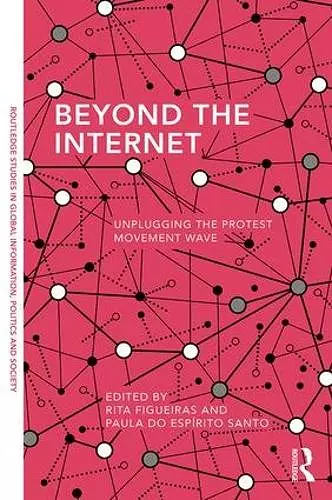Beyond the Internet
Unplugging the Protest Movement Wave
Rita Figueiras editor Paula do Espírito Santo editor
Format:Hardback
Publisher:Taylor & Francis Ltd
Published:11th Dec '15
Currently unavailable, and unfortunately no date known when it will be back
This hardback is available in another edition too:
- Paperback£49.99(9780815370581)

The western economic and financial crisis began with the collapse of Lehman Brothers in 2008 and led the European Union countries into recession. After this, governments started to implement austerity measures, such as cuts in public spending, including public subsidies and jobs, and rising prices. In this context, Europe started to experience a wave of protest movements. Individuals started to use the manifold interactive digital media environment to both fight against the austerity measures and find alternative ways of claiming their democratic rights. Inspired by the 2011 Arab Spring and the Occupy Wall Street movement in New York (USA), the Occupy LSX encampment in Central London (UK), The Outraged (Los Indignados)/ 15M encampment in Central Madrid (Spain), the Syntagma Square’s Outraged movement in Athens (Greece) and the March 12th Movement in Lisbon (Portugal), although short-lived, epitomize an emerging alternative politics and participation via the media. This wave has promoted a debate on how the realm of politics is changing, as citizens broaden their ideas of what political issues and participation mean.
Beyond the Internet examines the technological dimension of the recent wave of protest movements in the United Kingdom, Spain, Portugal, Greece, and Ireland. Offering an opportunity to achieve a better understanding of the dynamics between society, politics and technology, this volume questions the essentialist attributes of the Internet that fuel the techno-centric discourse. The contributors illustrate how all these protest movements were active in the social media and garnered high levels of media attention and public visibility, in spite of their failure to achieve their political goals. As intra-elite dissent was pivotal in understanding the Arab uprisings, the coalition of national ruling elites with European institutions in terms of austerity strategy is essential in understanding the limits of media/technology power and, therefore, the dissociation between communication and representative power.
'Beyond the Internet addresses a challenging question of much political communication research: to what extent the Internet and social media determine political participation and behaviour. The temptation of technological determinism and cyber-optimism is always lurking when it comes to explain why and how political protests have spanned through Europe in rich new-media ecosystems. The greatest strength of this volume is the authors’ ability to provide convincing evidence that the Internet’s magic is rather embedded in extra-web structures. The Internet empowers above all those that already possess a political culture. This book will be extremely useful not only to researchers but to practitioners in the media and in the political system.' - Gianpietro Mazzoleni, University of Milan, Italy
'This is an extremely timely collection on the role of digital media and the internet in protest movements which avoids simplistic celebrations of technological affordances but yet gives the media proper attention. Through well chosen empirical cases and theoretical rigour, this is essential reading for anyone trying to understand the contemporary economic and political crises in Europe and beyond.'-Göran Bolin, Södertörn University, Sweden
'This good collection examines how the internet has empowered radical opposition in Western Europe, but also takes account of the formidable obstacles that still stand in the way of its succeeding. It is a scholarly, level-headed but also uplifting book.' - James Curran, Goldsmiths, University of London, UK
ISBN: 9781138915640
Dimensions: unknown
Weight: 362g
170 pages